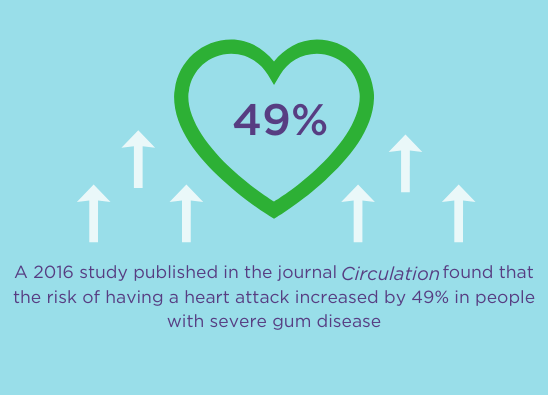Originally published July 2017. Updated February 2023.
For a long time, heart disease and stroke was considered an issue that only affected men. And while that isn’t true, the misunderstanding isn’t surprising since for the majority of the 20th century, more men died of heart disease than women.
But since the mid-1980s, deaths from heart disease among women have steadily climbed. In fact, since 2017, cardiovascular disease has remained the primary cause of death in both men and women, and research from the American Heart Association indicates that 1 in 3 women will die from heart disease every year in the US.
Working to keep your heart healthy might seem straight forward – eat healthy, exercise regularly. But research about the causes and treatments of heart disease - especially in women - continues to expand. For example, did you know that your dentist can help keep your heart healthy? It's true! Good oral health reduces inflammation that can exacerbate underlying issues in the body, and some of the bacteria that enter through your mouth and can be stopped with routine preventive dental care have been linked to heart disease.
It just goes to show that good oral health is required to maintain your overall health. As the nation's largest not-for-profit dental benefits providers, Delta Dental of Washington is committed to fostering a community and network of healthcare partners that, together, lower barriers to access the care people need.
So today, Delta Dental of Washington is participating in Wear Red Day, in partnership with the American Heart Association, to celebrate their Go Red for Women initiative which spreads awareness about the threat of heart disease and stroke to women.
Learn how to participate in Wear Red Day and support the American Heart Association
How are gum disease and heart disease connected?
Our bodies are complex systems. Problems in one area can often lead to problems in others, and the mouth is no exception. Research has shown that poor oral health may be linked to everything from diabetes to dementia, and now scientists believe that gum disease might have a direct link to diseases of the heart.
The connection first started more than 20 years ago when the American Academy of Periodontology issued a warning that inflammation and infection of the gums can lead to conditions such as heart attack and stroke. Since then, numerous studies have been conducted to back up this connection.
One review of multiple studies found that pre-existing periodontitis (severe gum disease) increased a person's risk of heart disease by 20%. Another study published in 2016 found that "the risk for myocardial infarction [heart attack] was significantly increased among subjects with periodontitis with an odds ratio of 1:49." (That's a whopping 49%.)
While researchers across all studies have pointed out that periodontitis is not an absolute cause of heart disease (since there are many other factors at play such as poor diet and tobacco use), the correlation is hard to ignore.
How does gum disease lead to heart disease?
Gum disease is an infection of the gums that's caused by chronic buildup of plaque on the teeth. Plaque is a sticky, bacteria-filled substance that accumulates around the teeth and under the gums throughout the day.
Brushing, flossing, and regular visits to the dentist help remove plaque and prevent it from turning into much harder-to-remove tartar. Both plaque and tartar are breeding grounds for the poisonous bacteria that cause gum disease.
When early gum disease, known as gingivitis, progresses into periodontitis, it pulls the gums away from the teeth and can lead to visibly receding gums and even permanent tooth loss. As this occurs, it opens up the mouth for even more bacteria to circulate to other areas of the body, where they cause blood vessel inflammation and damage.
"The bacteria that live in your mouth when you have gum disease can cross into your bloodstream, enter your heart, and directly infect the vulnerable heart valves," says Dr. Marietta Ambrose, an assistant professor of clinical medicine at the University of Pennsylvania's Perelman School of Medicine.
According to Penn Med, this has been proven as "researchers have uncovered oral bacteria in the fatty deposits of people with atherosclerosis, a disease in which plaque builds in the arteries [of the heart]. Untreated, those deposits can narrow arteries or break loose and clog them, causing a heart attack or stroke."
How to prevent gum and heart disease
These facts may be alarming, especially given that an estimated half of American adults suffer from gum disease. But as with so many things related to our health, we can all be proactive to mitigate the risk.
- Of course, brushing twice a day helps reduce the buildup of plaque and tartar that attract harmful bacteria to the teeth and gums. Look for a soft- or medium-bristled toothbrush that won't injure your gum, and brush gently using circular motions. Don't forget to brush your tongue and the inside of your cheeks too!
- Floss between your teeth and gums at least once a day. (For more information, read our blog on the differences between traditional floss and a water flosser.)
- Visit your dentist twice a year for regular checkups and cleanings. Addressing problems early on is key to maintaining your health, so be sure to bring up any issues you've noticed, such as swollen or bleeding gums or unusually sensitive teeth. They can work with you on proper brushing and flossing techniques, and may even recommend specialty products such as a folic acid mouthwash.
As we mentioned before, however, it's important to keep in mind that not everyone will have a direct connection between heart and gum disease. Plenty of people can have one without developing the other, and shared risk factors can make it difficult to determine an exact cause of either.
That said, there are a few ways you can lower your risk for both gum and heart disease:
- Stop smoking or using other tobacco products. (Or better yet, never start in the first place!)
- Eat a diet high in vegetables, low-sugar fruits, and lean proteins. A healthy diet reduces the risk for high cholesterol that leads to heart conditions, while also lowering the amount of sugars, starches, and acids that can weaken teeth.
- Stay active! Frequent exercise is one the best things we can do for our overall health.
- Find ways to lower your stress throughout the day. Stress and high blood pressure can negatively affect every part of our bodies, including our hearts and mouths.














